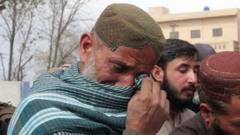More than 400 individuals were aboard the Jaffar Express when chaos erupted in central Pakistan's Bolan Pass on Tuesday. As passengers traveled from Quetta to Peshawar, an explosive blast tore through the tracks, grounding the train to a sudden halt. Eyewitness Mehboob Hussain recounted the horrifying moments that followed, as gunfire erupted and a group of armed militants stormed the train.
The Balochistan Liberation Army (BLA) quickly claimed responsibility for the attack, issuing a chilling ultimatum for the release of Baloch political prisoners within 48 hours. The BLA, labeled a terrorist organization by multiple countries, has long sought independence for Balochistan, frustrated by what they view as exploitation and neglect by the Pakistani authorities.
In a siege that spanned over 30 hours, at least 300 passengers have reportedly been rescued; however, numbers indicate that many remain unaccounted for. Eyewitnesses described harrowing "doomsday scenes" as chaos unfolded on the train, with passengers caught between gunfire and the militants' threats.
Contrary to earlier reports, an onboard railway police officer clarified that the train was in an open area when the assault began. This officer, alongside colleagues, initially attempted to fend off the militants before running out of ammunition. The BLA militants, reclaiming firearms from their surroundings, proceeded to take control of the situation with a brutal display of power.
As night fell, the grim nature of the hijacking became evident. Reports suggested the militants were executing hostages—civilians and military personnel alike—while allowing certain passengers, including women, children, and Balochistan locals, to exit the train unharmed.
With military forces encircling the area, rescue operations intensified. Eyewitness accounts from passengers emphasized the confusion and fear during the chaos. The first major rescue attempt succeeded amid the morning call to prayer, allowing several to escape as they capitalized on the militants’ distraction.
Despite the military's claims of neutralizing the hostage-takers, questions about the safety of the remaining passengers linger. Reports suggest that numerous hostages were taken away by the militants, leaving many families anxious about the fate of their loved ones.
As survivors attempt to piece together their ordeal, one passenger, Noor Muhammad, expressed profound gratitude for his survival, emphasizing the thin line between despair and relief in the wake of such a violent confrontation. As Balochistan continues to be plagued by instability and insurgency, the international community remains attentive to the situation, hoping for an end to the cycle of violence that has overshadowed the region for decades.
The Balochistan Liberation Army (BLA) quickly claimed responsibility for the attack, issuing a chilling ultimatum for the release of Baloch political prisoners within 48 hours. The BLA, labeled a terrorist organization by multiple countries, has long sought independence for Balochistan, frustrated by what they view as exploitation and neglect by the Pakistani authorities.
In a siege that spanned over 30 hours, at least 300 passengers have reportedly been rescued; however, numbers indicate that many remain unaccounted for. Eyewitnesses described harrowing "doomsday scenes" as chaos unfolded on the train, with passengers caught between gunfire and the militants' threats.
Contrary to earlier reports, an onboard railway police officer clarified that the train was in an open area when the assault began. This officer, alongside colleagues, initially attempted to fend off the militants before running out of ammunition. The BLA militants, reclaiming firearms from their surroundings, proceeded to take control of the situation with a brutal display of power.
As night fell, the grim nature of the hijacking became evident. Reports suggested the militants were executing hostages—civilians and military personnel alike—while allowing certain passengers, including women, children, and Balochistan locals, to exit the train unharmed.
With military forces encircling the area, rescue operations intensified. Eyewitness accounts from passengers emphasized the confusion and fear during the chaos. The first major rescue attempt succeeded amid the morning call to prayer, allowing several to escape as they capitalized on the militants’ distraction.
Despite the military's claims of neutralizing the hostage-takers, questions about the safety of the remaining passengers linger. Reports suggest that numerous hostages were taken away by the militants, leaving many families anxious about the fate of their loved ones.
As survivors attempt to piece together their ordeal, one passenger, Noor Muhammad, expressed profound gratitude for his survival, emphasizing the thin line between despair and relief in the wake of such a violent confrontation. As Balochistan continues to be plagued by instability and insurgency, the international community remains attentive to the situation, hoping for an end to the cycle of violence that has overshadowed the region for decades.




















